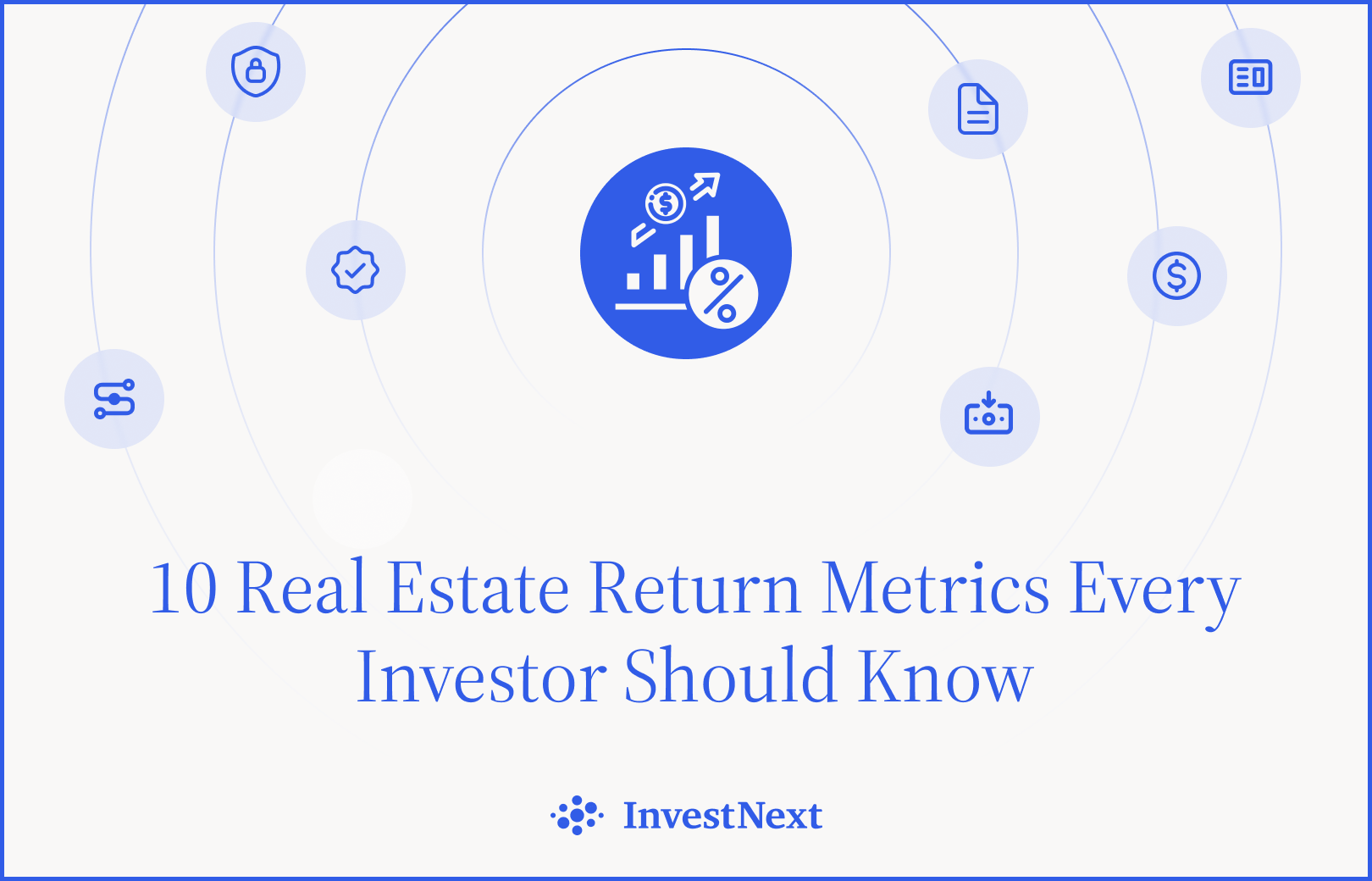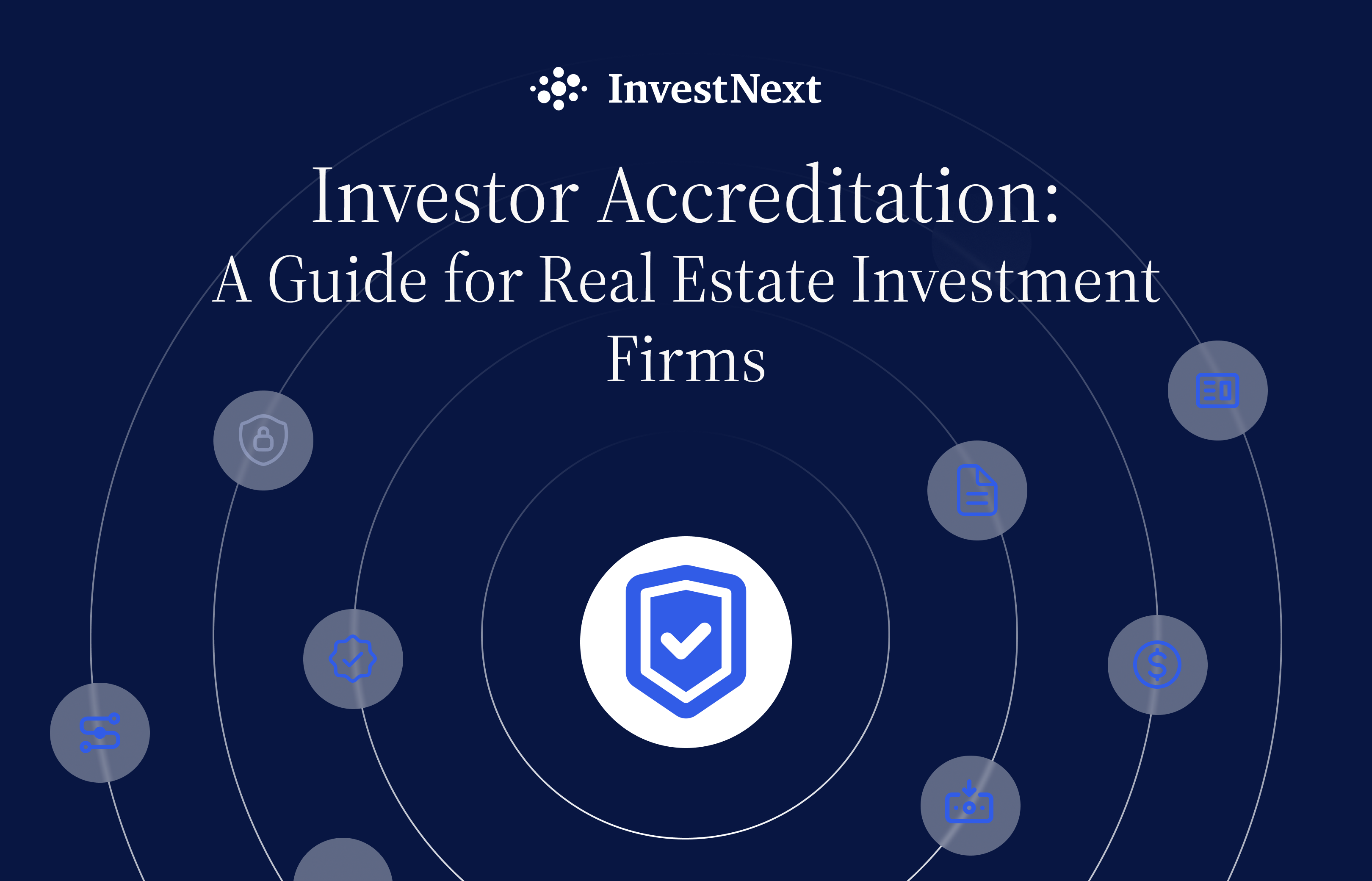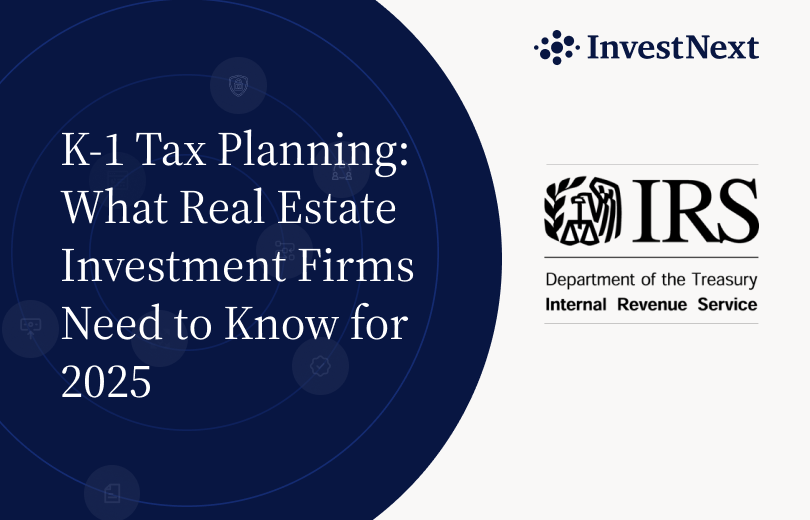Investing in commercial real estate has proven to become a stable and attractive alternative to showcase value and stability for investors. With access to deals through crowdfunding sources, non-institutional investors of all sizes now have quite the same opportunities as institutional entities to generate passive income, ultimately leading to wealth for the masses.
Historically, non-institutional real estate investors had limited opportunities to participate in large-value commercial real estate assets. At the same time, Institutional-grade investments were available exclusively to major financial institutions, experienced investors, and the wealthy.
This article will identify the differences between institutional-grade and non-institutional-grade investors by definition, benefits, and type.
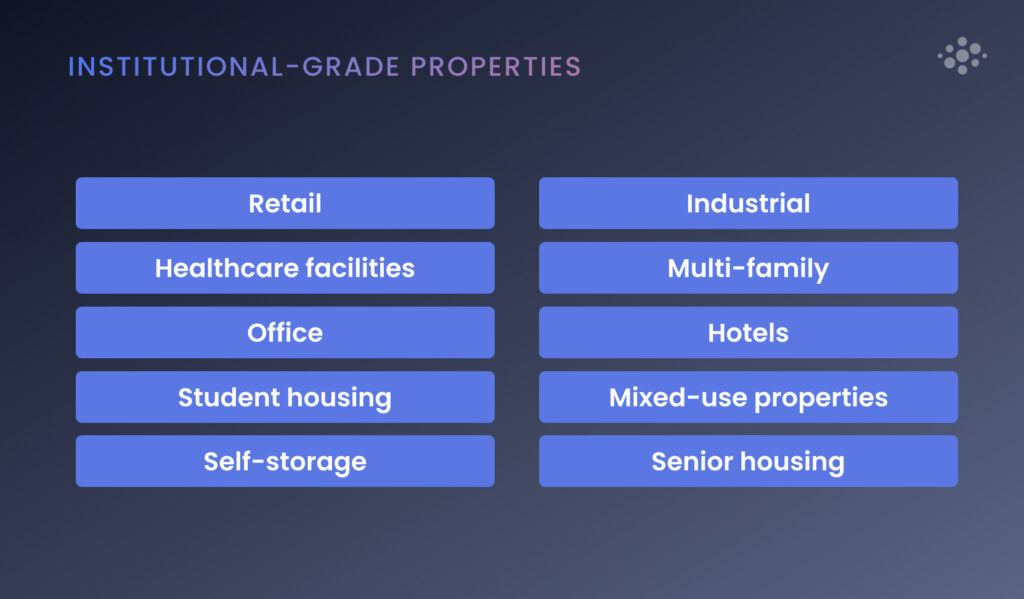
Institutional Real Estate by Definition
According to the Institutional Real Estate Institute (IREI), institutional-grade properties refer to different real estate assets typically owned or financed by institutional investors. These core investments include retail, office, industrial, multi-family units, and specialty investments such as healthcare facilities, hotels, student housing, senior housing, self-storage facilities, and mixed-use properties.
A property is often considered institutional-grade or institutional-quality if it is significant and attractive enough to attract the attention of major national or international investors.
High-end assets in major markets priced above the means of individual investors and smaller partnerships are the hallmark of institutional-grade real estate.
These asset types include industrial/logistic properties of grade A and B quality: warehouses and data centers to commercial properties: offices, multi-family, and retail stores to critical infrastructure like energy pipelines, solar panels, and fiber optic cables.
Institutional Real Estate Investors
The big boys on the block with a lot of financial power to move things around—are institutional investors. They include hedge funds, insurance firms, investment banks, commercial trusts, endowment funds, pension funds, mutual funds, money managers, and private equity investors. Over 85% of the New York Stock Exchange’s transaction volume comprises of institutional investors and can significantly affect the stock market’s volatility by moving large blocks of shares.
The capital used by institutional investors is not the capital that the institutions themselves own. Institutional investors typically invest on behalf of other businesses, groups, and individuals.
In reference to commercial real estate, institutional real estate investors will invest large sums of money, ranging between millions or billions of dollars into commercial real estate opportunities. Due to the size and scope of their investments, they have significant advantages compared to non-institutional investors, such as access to exclusive investment deals that are not available to the public.
An example would be an institutional investor who may invest in a portfolio of self-storage projects across the US directly from a developer, rather than a single self-storage property in one location, which would not be an attractive investment opportunity for their clients.
Non – Institutional Real Estate Investors
Retail investors, also known as non-institutional investors, are individuals or small groups of business partners who invest for their benefit rather than for someone else. They typically buy a property through a broker, bank, crowdfunding, or private equity real estate deal, rather than having direct access to opportunities like institutional investors. Both types of investors aim to earn a return on their investment. However, retail investors often have a longer-term goal, such as retirement planning or building a portfolio to pass down to future generations.
Non-institutional Types:
Non-institutional investors are also categorized as either accredited or non-accredited. An accredited investor in the context of a natural person comprises anybody who:
- Maintains a gross income exceeding $200,000 or $300,000 with a spouse/partner and is expected to receive the same amount for the following year.
- Possess a net worth of over $1 million, alone or with a spouse/partner (excluding primary residence).
- Holds valid Series 7, 65, or 82 licenses.
Other types of accredited investors include
- A trust with total assets above $5 million whose acquisition is controlled by a sophisticated person.
- An entity with total investments over $5 million, not created especially to acquire the relevant securities.
- An entity in which all equity owners are accredited investors.
Institutional Investors vs. Non-institutional Real Estate Investors
There are a few significant distinctions between institutional and non-institutional investors in real estate:
- Institutional investors concentrate on larger investments ranging over $10 million for a single asset.
- Institutional investors look for institutional-grade, high-quality, brand-new Class A and Class A+ assets considered “picture perfect.” In contrast, retail investors may choose opportunities where they may add value or buy, refurbish, and rapidly resell them depending on their investing goals from various alternatives.
- Institutional investors benefit from reduced fees throughout the investment process.
- Due to the fact that institutional-grade assets are brand-new Class A and Class A+ properties, there is minimal danger of obsolescence or degradation throughout the holding period.
- Compared to other investment alternatives, institutional-grade real estate is leased to tenants with strong regional or national credit and substantial financial resources.
- In an economic downturn, institutional investments in the market often decline dramatically.
- Institutional investors are subjected to less protective legislation due to investing knowledge and skillfulness, but retail investors are subjected to more protective regulation due to perceived expertise and education.
Institutional and non-institutional investors seek to earn a return on their investments, but their strategies and resources differ. Institutional investors are more likely to engage in leveraged acquisitions, while retail investors tend to be more cautious and conservative in their investment strategies.
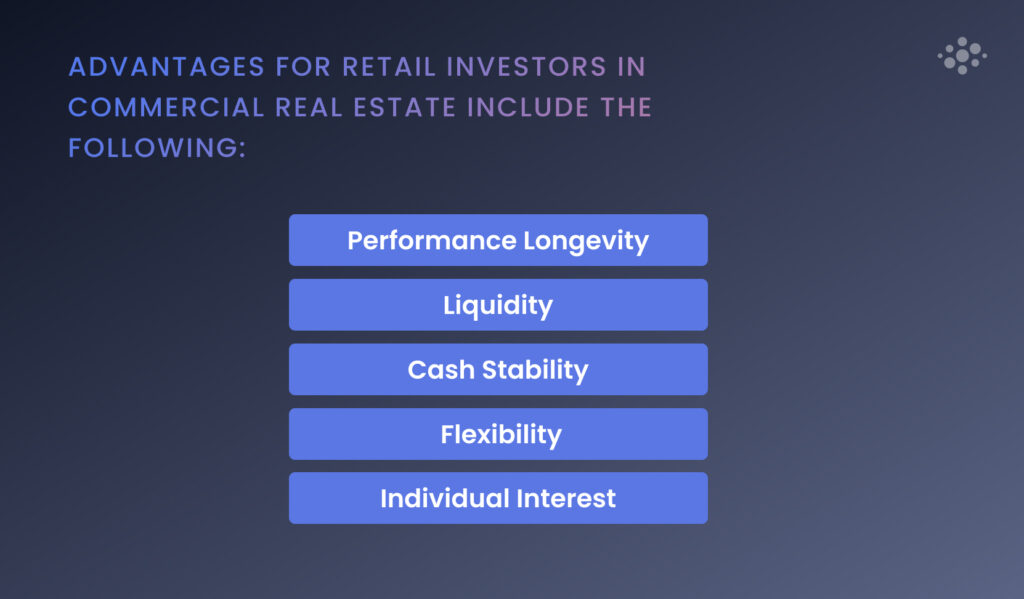
Benefits of a Retail Investor
Based on the above, institutional investors might seem to have a competitive advantage. However, since retail investors buy properties for their use, they are much more nimble and have access to a broader range of commercial real estate investments than institutional investors.
Advantages for Retail Investors in commercial real estate include the following:
- More straightforward, smaller investments: Retail investors have the option to invest in diverse types and sizes of real estate through syndications and various crowdfunding efforts.
- Performance longevity: Retail investors can overlook short-term market corrections and focus on making long-term investments, whereas institutional investors must give their clients quarterly and annual performance reports. Small retail investors have the flexibility to play the long game since they only answer to themselves and occasionally joint venture partners. Institutional investors that often buy and sell real estate might incur inflated costs that harm the performance of their portfolios.
- Liquidity: When retail investors purchase and sell commercial real estate, property values often do not move, which increases market liquidity for retail real estate investors. However, the amount of money institutional investors invest may and do significantly affect real estate values.
- Cash Stability: Retail investors may sell and hold funds on the sidelines until the perfect investment chances present themselves since real estate markets are more liquid. On the other hand, institutional investors are under pressure to retain every dollar invested, even if the returns are below average.
- Flexibility: Retail investors are free to concentrate on commercial real estate asset classes that provide strong returns throughout all economic cycles, including unconventional assets like data centers and self-storage. Institutional investors are responsible for managing their clients’/shareholders’ finances, thus, are compelled to diversify their portfolios to reduce potential risks.
- Individual Interest: When someone invests on their behalf, they are far more concerned with the type and quality of the investment and take a personal interest in following the asset’s progress. Retail investors can dedicate the time and show the same level of personal involvement as institutional real estate investors that manage hundreds of properties in a portfolio.
Types of Institutional Investors often fall into one of six categories:
Private Equity Funds:
PEF involves private equity investors that make active or passive investments in medium- to large-scale projects, including multi-family housing, intending to upgrade the asset, enjoy some income flow, and ultimately sell to realize a capital gain.
Mutual Funds:
Shares in a mutual fund may be bought by institutional and ordinary investors. Besides real estate, portfolios may include money market funds, equities like stocks, and fixed-income securities like bonds.
Pension Funds:
Utilize retirement funds to generate a retirement income for the retiree. They frequently invest in large real estate holdings and seek long-term income and capital growth. These pension funds have substantial money under their control, including cash from federal and state retirement programs like Social Security and the military.
Hedge Funds:
Hedge funds attempt to provide above-market returns for investors by combining cash from authorized retail and institutional investors. Because hedge funds are frequently viewed as a more risky investment choice since they engage in leveraged investing, short selling, and buy/sell derivatives, all of which have the potential to raise earnings.
Banks:
Commercial banks are some of the world’s most prominent institutional real estate investors. They could invest on a client’s behalf or with their own resources to boost their profitability.
Endowment Funds:
Endowment funds are used to invest money that non-profit and charitable organizations, such as hospitals or colleges, donate or raise. Investments are typically made following the wishes of its founders or donors and are usually made in income-producing assets, including stocks, bonds, and commercial real estate.
Insurance Funds:
Insurance funds, like pension funds, return insurance premiums to stable income-generating assets such as institutional-grade commercial real estate.
Bottom Line
An institutional investor is well-equipped to offer you excellent returns if you invest through them. However, your professional’s choices can be more volatile or riskier compared to the average investor. When considering taking the route of a non-institutional investor, the success of a well-organized real estate investment management plan requires the expertise and modernized tools to communicate and manage investor performance.
InvestNext is an institutional-grade real estate syndication software platform that enables you to manage the complete lifecycle of your real estate venture. Your investors can send inbound payments, validate their accreditation status and commit to deals within our white-labeled investment management ecosystem.
As the sponsor, you can manage, communicate and showcase deal offerings within the sponsor portal. Additionally, our software allows you to distribute funds among your investors through waterfall calculations or payouts after completing your real estate projects.
Schedule a demo today to see how our team can help you to welcome the next level of raising capital.

